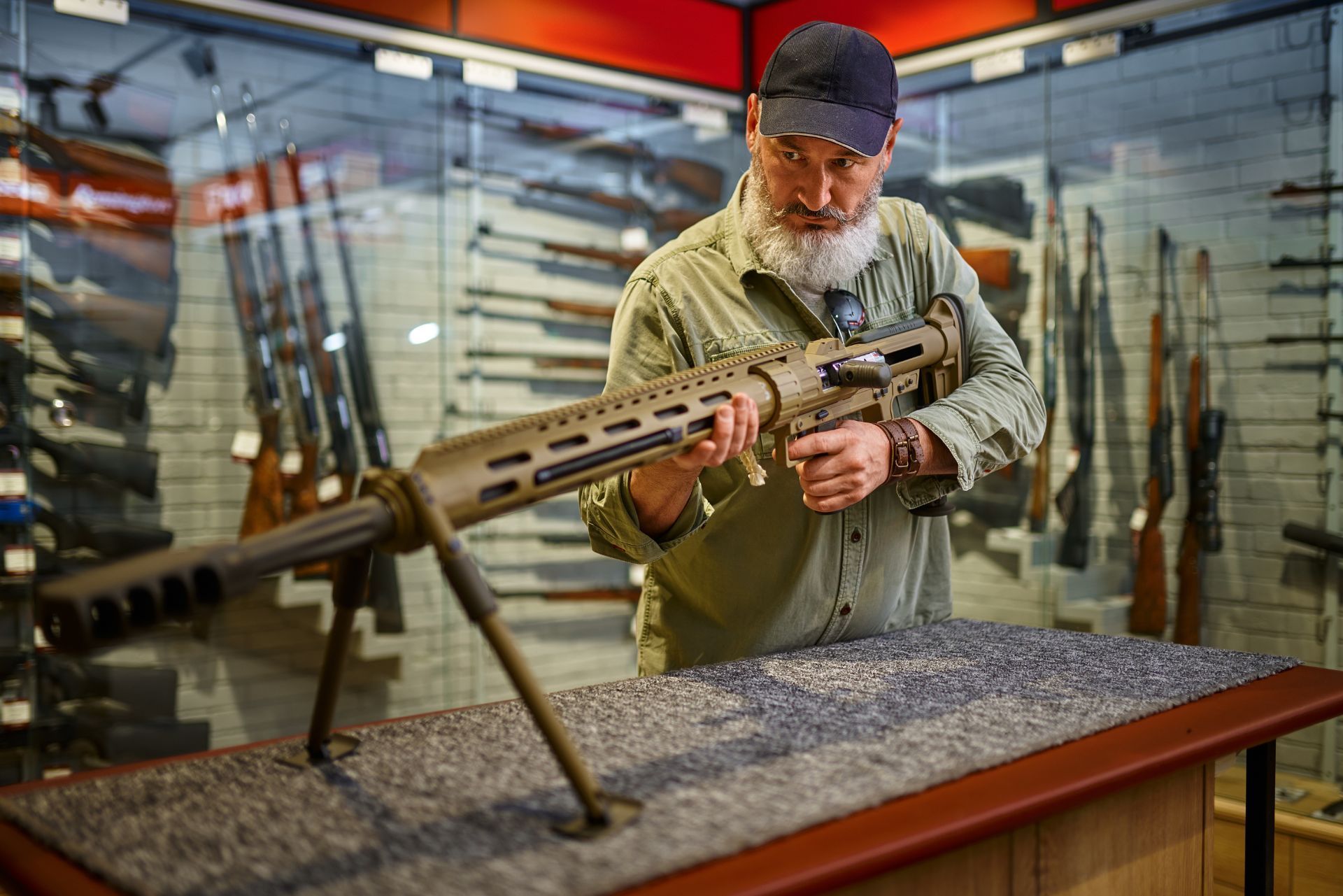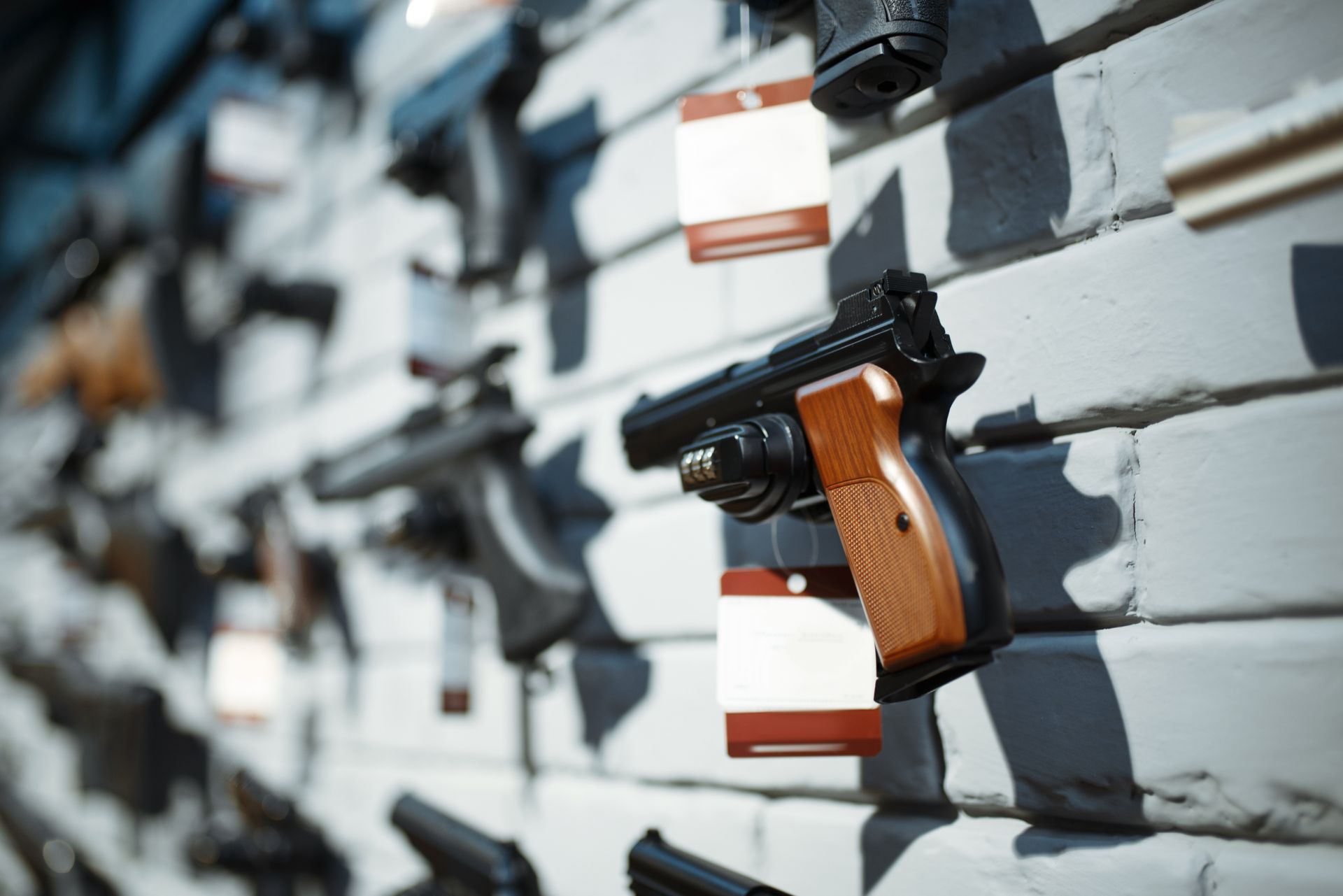Top 3 Recommended Policies

The firearms industry in the United States is a significant and growing sector, contributing billions to the economy and supporting thousands of businesses and jobs nationwide. With over 8,200 businesses operating within the shooting ranges industry alone as of 2025, and the firearm and ammunition industry contributing $91.7 billion to the U.S. economy, it's clear this market is both substantial and complex. For firearms dealers and gun range operators, navigating the risks inherent in this industry requires specialized insurance coverage tailored to their unique needs.
In this comprehensive guide, we’ll explore everything you need to know about firearms dealer and gun range insurance—from the types of coverage available to why it’s essential for your business protection. Whether you run a retail gun shop, manage a shooting range, or both, understanding insurance nuances can save you from costly liabilities and help your business thrive.
For more insights into the economic impact of the firearms industry, you can visit the National Shooting Sports Foundation’s report.
Why Firearms Dealer & Gun Range Insurance Is Crucial
Operating within the firearms industry involves unique risks that standard business insurance policies often do not cover. From product liability to premises risks and employee safety, firearms dealers and gun ranges face potential claims that can be financially devastating without proper insurance.
For example, the firearm industry employs more than 31,000 people directly in the U.S., and with millions of firearms sold annually, the potential for accidents, misuse, or legal disputes is significant. Insurance helps mitigate these risks by providing financial protection against lawsuits, property damage, and other liabilities.
Additionally, the firearm industry contributes approximately $1.2 billion annually in tax revenue, underscoring its importance to the economy and the need for businesses to operate responsibly and securely. This economic contribution highlights the interconnectedness of the firearms industry with various sectors, including manufacturing, retail, and even tourism, as many gun ranges attract visitors from outside their local areas for recreational shooting and training.
Moreover, the firearms industry is evolving with advancements in technology and changes in consumer preferences. As new firearms and accessories are developed, dealers must stay informed about the latest products and their associated risks. This dynamic environment means that insurance needs can change rapidly, making it essential for dealers and ranges to regularly review and update their coverage to ensure they are adequately protected against emerging threats.
Key Risks Faced by Firearms Dealers and Gun Ranges
Some of the primary risks include:
- Product Liability: Claims arising from defects or malfunctions in firearms or ammunition sold.
- Premises Liability: Injuries occurring on the property, such as shooting accidents or slip-and-fall incidents.
- Employee Injuries: Workplace accidents or injuries sustained by staff.
- Theft and Vandalism: Firearms and ammunition are high-value targets for theft, requiring coverage for losses.
- Legal and Regulatory Compliance: The firearms industry is heavily regulated, and compliance failures can lead to fines or legal action.
In addition to these risks, firearms dealers and gun ranges must also navigate the complexities of public perception and community relations. Negative incidents involving firearms can lead to increased scrutiny from both the public and regulatory bodies, making it imperative for businesses in this sector to maintain a strong reputation and demonstrate a commitment to safety and responsible practices. This can include implementing rigorous training programs for employees, enhancing security measures, and engaging in community outreach to foster a positive image.
Furthermore, the rise of social media and online platforms has transformed how firearms businesses interact with customers and the public. While these platforms offer opportunities for marketing and engagement, they also present risks related to misinformation and negative publicity. Dealers and ranges must be proactive in managing their online presence and addressing any concerns that may arise, as a single viral post can have significant implications for their business and insurance needs.

Types of Insurance Coverage for Firearms Dealers and Gun Ranges
Insurance policies for firearms businesses are tailored to address the specific exposures these operations face. Understanding the different types of coverage available can help you select the right protection for your business.
General Liability Insurance
This is the foundational coverage for any firearms business. It protects against third-party bodily injury, property damage, and personal injury claims. For gun ranges, this might include injuries to customers or visitors, while for dealers, it covers incidents related to the sale or use of firearms on the premises.
Given the high-risk nature of firearms, general liability policies for dealers and ranges often have specialized endorsements or exclusions, so working with an insurer familiar with the industry is critical. Additionally, it’s important to regularly review and update your policy to ensure it reflects any changes in your business operations or the legal landscape surrounding firearms. This proactive approach can help mitigate potential risks and ensure that you are adequately covered in the event of an unexpected incident.
Product Liability Insurance
Firearms dealers face unique risks related to the products they sell. Product liability insurance protects against claims arising from defective or malfunctioning firearms or ammunition that cause injury or damage. This coverage is essential given the volume of firearms sold legally in the U.S.—approximately 4.5 million annually—and the potential for lawsuits. The stakes are particularly high when considering that even minor defects can lead to catastrophic outcomes, making it crucial for dealers to ensure that their products meet rigorous safety standards and quality controls.
Property Insurance
Protecting your physical assets, including inventory, equipment, and the building itself, is vital. Firearms and ammunition are high-value items, and theft or damage can lead to significant losses. Property insurance covers losses from fire, theft, vandalism, and certain natural disasters. Furthermore, it’s advisable to consider additional coverage options such as business interruption insurance, which can provide financial support during periods when your operations are halted due to a covered event, allowing you to maintain cash flow while you recover.
Workers’ Compensation Insurance
With over 31,000 people employed directly in the firearm industry, workplace injuries are a real concern. Workers’ compensation insurance covers medical expenses and lost wages for employees injured on the job, protecting both staff and business owners. In addition to providing essential coverage, implementing a robust safety training program can help reduce the likelihood of workplace accidents, fostering a safer environment and potentially lowering insurance premiums over time.
Commercial Auto Insurance
If your business involves transporting firearms or ammunition, commercial auto insurance is necessary to cover vehicles and drivers in case of accidents or damage during transit. This type of insurance not only protects your vehicles but also covers liability for any injuries or damages caused by your drivers while on the road. Given the sensitive nature of transporting firearms, ensuring compliance with local and federal regulations during transport is also crucial to avoid legal complications.
Cyber Liability Insurance
As the firearm industry has seen a 25% increase in online sales over the past five years, protecting customer data and business information from cyber threats has become increasingly important. Cyber liability insurance helps cover losses from data breaches, cyberattacks, and related liabilities. With the rise of e-commerce, firearms dealers must also invest in secure payment processing systems and data protection measures to safeguard sensitive customer information, as a breach can not only lead to financial loss but also damage your business’s reputation and customer trust.
Special Considerations for Gun Range Insurance
Gun ranges face additional risks due to the nature of their operations. Managing live firearms on-site, ensuring customer safety, and maintaining regulatory compliance are critical concerns. The unique environment of a gun range requires operators to be proactive in identifying potential hazards and implementing measures to mitigate them. This includes regular inspections of equipment, thorough training for staff, and clear communication of safety rules to patrons. The stakes are high, and the responsibility of ensuring a safe shooting experience rests heavily on the shoulders of range operators.
Range Liability Coverage
Range liability insurance specifically covers incidents that occur during the use of the range, such as accidental discharges, ricochets, or injuries from target practice. This coverage often includes protection against claims from customers injured while using the range facilities. Additionally, it can extend to cover legal fees associated with defending against lawsuits stemming from these incidents. Given the potential for high medical costs and legal settlements, having robust liability coverage is not just a safeguard but a necessity for any responsible gun range operator.
Environmental Liability
Gun ranges must also consider environmental risks, such as lead contamination from bullets and other pollutants. Environmental liability insurance can help cover cleanup costs and legal claims related to environmental damage. Furthermore, ranges are often subject to strict environmental regulations that require regular monitoring and reporting of lead levels and other hazardous materials. Investing in lead abatement programs and sustainable practices can not only mitigate these risks but also enhance the range's reputation within the community, showcasing a commitment to environmental stewardship and public health.
Safety and Training Programs
Implementing comprehensive safety protocols and training programs not only reduces risk but can also lower insurance premiums. Many insurers look favorably on ranges that demonstrate a commitment to safety and regulatory compliance. These programs can include regular drills, safety briefings before shooting sessions, and the use of advanced technology to monitor shooting practices. Furthermore, offering educational workshops for both novice and experienced shooters can foster a culture of safety and responsibility, encouraging patrons to take ownership of their actions while on the range. This proactive approach not only protects the business but also builds trust and loyalty among customers, who appreciate a facility that prioritizes their well-being.
Factors Influencing Insurance Costs for Firearms Businesses
Insurance premiums for firearms dealers and gun ranges vary widely based on several factors. Understanding these can help you manage costs while ensuring adequate coverage.
Business Size and Revenue
Larger businesses with higher revenues typically face higher premiums due to increased exposure. With the firearm industry generating over $8 billion annually in firearm sales, dealers with significant sales volumes will pay accordingly. Additionally, larger businesses may also have more complex operations, which can introduce unique risks that insurers must account for. This complexity can include everything from managing a larger inventory of firearms to dealing with a higher volume of customer interactions, each of which can present its own set of challenges and potential liabilities.
Location and Crime Rates
Businesses located in areas with higher crime rates or stricter regulations may face higher premiums. The risk of theft or liability claims influences insurer pricing. For instance, a gun range situated in an urban area with a history of gun-related incidents may find it more challenging to secure affordable insurance. Conversely, businesses in rural areas with lower crime rates might benefit from reduced premiums. Furthermore, local laws and community attitudes towards firearms can also impact insurance costs, as insurers often assess the regulatory environment when determining risk levels.
Claims History
A history of frequent or severe claims can increase premiums. Maintaining a clean claims record through effective risk management is beneficial. Insurers often look at the types of claims made; for example, claims related to negligent handling or improper storage of firearms can raise red flags. Therefore, firearms businesses should prioritize comprehensive training for employees and establish clear protocols for handling firearms to mitigate potential risks. Regular audits and safety drills can also help in maintaining a positive claims history.
Safety Measures and Training
Implementing rigorous safety protocols, employee training, and security measures can reduce risk and lower insurance costs. For instance, investing in advanced security systems, such as surveillance cameras and alarm systems, not only protects the business but also demonstrates to insurers that the business is proactive about risk management. Additionally, providing ongoing training for employees on the latest safety practices and legal requirements can further enhance the business's safety profile, potentially leading to discounts on premiums. Regularly reviewing and updating safety protocols is essential to adapt to new risks as they arise.
Product Range and Services Offered
Offering additional services such as firearms training, repairs, or rentals may affect coverage needs and premiums. Each of these services introduces different levels of liability and risk. For example, a business that offers firearms training must ensure that instructors are certified and that all training sessions adhere to strict safety standards. This not only protects customers but also minimizes the risk of liability claims. Similarly, businesses that provide rental services must have robust policies in place to track rented firearms and ensure they are returned in safe condition. Insurers will assess these factors when determining the overall risk profile of the business, which can significantly influence the cost of coverage.

How to Choose the Right Insurance Provider
Selecting an insurer experienced in the firearms industry is crucial. These providers understand the unique risks and regulatory environment and can tailor policies accordingly.
Look for Industry Expertise
Insurers specializing in firearms businesses are more likely to offer comprehensive coverage and competitive rates. They can also provide valuable risk management advice.
Compare Coverage Options
Review policy terms carefully, including exclusions and limits. Ensure the policy covers all aspects of your operations, from product liability to environmental risks.
Check Financial Stability and Reputation
Choose insurers with strong financial ratings and positive customer feedback to ensure reliable claims handling.
Consider Bundling Policies
Bundling multiple coverages with one provider can often lead to discounts and simplified management.
Conclusion: Protecting Your Firearms Business for the Future
The firearms industry continues to grow, with approximately 393 million firearms owned by U.S. civilians, accounting for about 42% of the world’s civilian-held firearms. This growth, coupled with increasing online sales and expanding shooting range operations, underscores the importance of robust insurance coverage tailored to the unique risks of firearms dealers and gun ranges.
By understanding the types of insurance available and working with knowledgeable providers, firearms businesses can protect themselves against financial losses, legal liabilities, and operational disruptions. Investing in the right insurance not only safeguards your business but also helps build trust with customers and regulators alike.
For further details on industry growth and statistics, the
ZipDo Education Reports offer comprehensive insights into the current landscape of the firearms market.
Contact Us
Phone
Location
